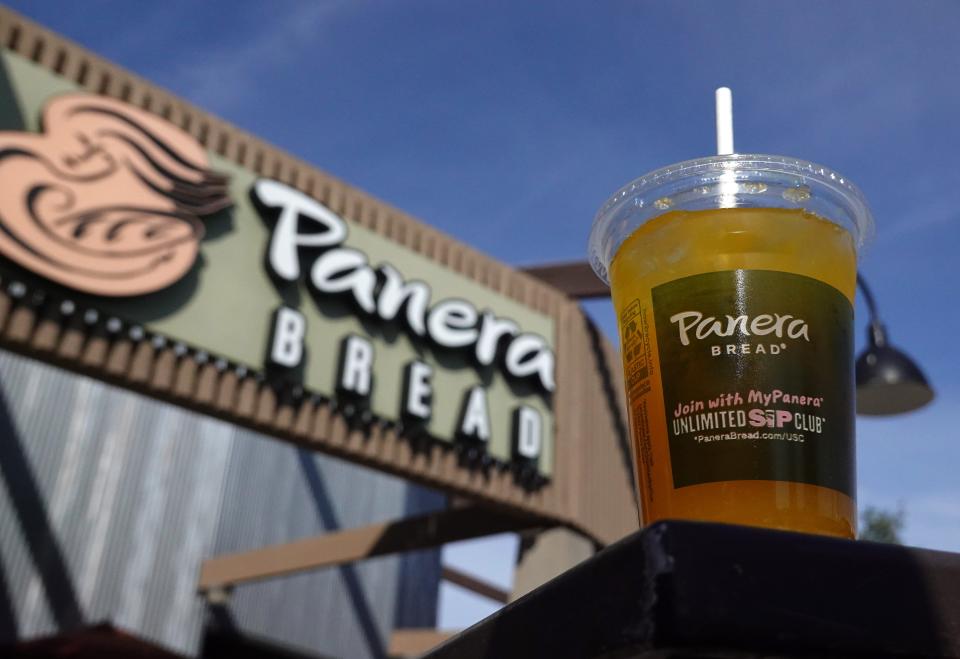18-year-old sues Panera Bread, claims Charged Lemonade caused him to cardiac arrest
An 18-year-old Pennsylvania high school student filed a federal lawsuit against Panera Bread on Monday alleging the fast-food restaurant's Charged Lemonade caused him to go into cardiac arrest.
Luke Adams, of Monroeville, Pennsylvania, sued the Panera Bread Company in the Eastern District of Pennsylvania after buying a Mango Yuzu Citrus Charged Lemonade on March 9 from one of the chain bakery cafés locations, according to the complaint.
Adams, who was not suffering from any health issues and consumed limited caffeine, drank the lemonade not knowing it contained 390 mg of caffeine without ice and 237 mg of caffeine with ice, the complaint says. Once Adams drank the lemonade and ate a chicken sandwich he bought, he went to a Cinemark movie theater to watch "Dune 2" with friends, the complaint continued.
During the film, one of Adams' friends "heard him making unusual sounds and took notice of him," according to the suit. The friend then realized that Adams was in sudden cardiac arrest, the suit says.

Panera Charged Lemonade lawsuits: Drinks linked to alleged deaths, heart issues
'Heavy caffeine intake' deemed as 'only potential trigger' for Luke Adams' cardiac episode
Adams' cardiac episode was later determined to be caused by ventricular fibrillation, a type of heart arrhythmia that can be triggered by caffeine, according to the complaint. While Adams was unresponsive, 911 was called, and his friends and strangers rendered aid, the complaint continued.
A cardiologist and two nurses performed CPR on Adams in the theater, the suit says. Two shocks from a defibrillator restored pumping to his heart, but his heart rhythm remained irregular, the legal document continued.
CPR continued to be performed until paramedics came and took Adams to a hospital where he was admitted to the ICU, intubated and put on a ventilator due to acute respiratory failure, according to the complaint. While in ICU, Adams suffered a second seizure, the complaint says.
Once Adams regained consciousness, he met with a neurologist who attributed his seizures to being possibly related to his cardiac episode and "caffeine intake from Panera Charged Lemonade," according to the suit. Adams' doctor also noted how "heavy caffeine intake" was identified as the "only potential trigger" for his cardiac episode, the suit continued.
A cardiac MRI showed no structural abnormalities in Adams' heart and genetic testing did not reveal any underlying seizure conditions that would have caused the cardiac event, the complaint says. An implantable cardioverter defibrillator was connected to Adams' heart on March 14 and it will remain implanted indefinitely for "preemptive secondary prevention," according to the complaint.
'Panera Charged Lemonade is an inherently dangerous product'
Adams' life has been impacted "physically, emotionally, socially and financially" since he drank Panera's Charged Lemonade, the complaint says. He currently suffers from PTSD and generalized anxiety due to the incident, the complaint continued.

"Luke Adams’ case is a tragic example of why the Panera Charged Lemonade is an inherently dangerous product and needed to be removed from the market," Elizabeth Crawford, Adams' attorney, said in a statement emailed to USA TODAY. "Clearly, the product's 'warning' was ineffective. Luke was a healthy 18-year-old with no underlying medical conditions before he drank one large Panera Charged Lemonade and went into cardiac arrest. He would have died if it was not for the heroic efforts of the medical professionals in the movie theater and at the hospital."
The suit claims that many ingredients in the charged lemonades are classified as "stimulants" by the Centers for Disease Control and Prevention. Stimulants can have dangerous health effects by damaging the nervous system and increasing blood pressure, heart rate and breathing, the complaint says.
A large-size Panera Charged Lemonade containing 390 mg of caffeine is significantly higher compared to a 12-fluid ounce can of Red Bull (114 mg of caffeine) and a 16-fluid ounce can of Monster Energy Drink (160 mg of caffeine), according to the suit.
To remedy Adams' case and Panera's failure to properly warn customers of their "dangerous product," the 18-year-old requests compensatory damages, punitive damages, interest and other costs relating to the suit, the complaint says.
USA TODAY contacted Panera Bread on Tuesday but did not receive a response.
Panera Bread announced removal of Charged Lemonade from menu
Adams' cardiac event occurred two months before Panera decided to remove the Charged Lemonade drinks from its menu.
The Missouri-based chain announced the removal of the item on May 7, but it has not confirmed when the drinks will no longer be available. The Charged Lemonades remain on the fast food restaurant's online menu as of Tuesday.
Panera Bread introduced the Charged Lemonades in 2022, but the chain has been sued multiple times due to the drink's caffeine content and ingredients. Suits filed in October and December of 2023 accuse the drinks of causing fatal cardiac arrests.
After the initial suit in October 2023, Panera changed the labels on its Charged Lemonade products, saying in a statement that it had "enhanced (its) existing caffeine disclosure for these beverages" out of "an abundance of caution."
Panera removed the drinks from self-serve fountains in January 2024.
How much caffeine is in Panera's Charged Lemonade drinks?
The drinks were previously reported as having 260 milligrams of caffeine in a regular size drink and as much as 390mg in a large drink. Before the drinks were officially removed from the menu, they contained 155-302mg of caffeine, depending on the size and flavor.
The recommended daily amount of caffeine for adults is up to 400mg, according to the Food and Drug Administration and Mayo Clinic about equal to 4-5 cups of brewed coffee.
Contributing: Mike Snider/ USA TODAY
This article originally appeared on USA TODAY: Panera's Charged Lemonade led to teen's cardiac arrest, lawsuit claims

